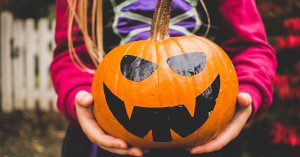Should Christians Celebrate Halloween?
*Note: If you choose to comment, make sure your comment is relatively brief (no more than 100 words), on topic, addressed to me, civil and respectful (not hostile or argumentative), and devoid of photos or links.*
In the United States and perhaps elsewhere October 31 is celebrated by most people, in some way, as an informal (not federal or state) holiday called “Halloween.” The word “Halloween” derives from the Old English “All Hallows Eve” or “The Evening Before All Saints Day.” Over the decades, it has taken on a distinctly different (than traditional religious) aspect. For many Americans, including many Christians, it is a night to revel in all things scary, spooky, haunting. The main feature is “Trick or Treating.” Kids go from house to house obtaining candy, usually wearing costumes. They ring doorbells and shout “Trick or Treat!” That is, if the outdoor lights are on. People in the U.S know what I am talking about.
Schools often celebrate Halloween with children encouraged to wear costumes to school, etc. Many churches have Halloween events, sometimes as alternatives to “Trick or Treating.” Sometimes in combination with that.
Even though I grew up in a fundamentalist Christian church and home, we celebrated Halloween with haunted house events, especially for youth. My brother and I went Trick or Treating. Way back then, we had to actually do a “trick” of some kind to get the candy. That seems to have gone away.
A few years ago, many Christians began to become aware that Halloween, October 31, is vaguely related to a pagan holiday called Samhain (pronounced “sow-han.” That was believed by pre-Christian European pagans to be the night when the “veil” between the living and the dead is most thin and therefore “ripe” for communication with the dead. And/or it was simply a harvest festival with bonfires (remnants of ancient sacrifices?) and possibly rituals of various kinds observing the changing of the seasons.
Modern Wiccans still observe Halloween as Samhain and practice rituals related to the supposed spiritual forces of nature.
Having lived several decades (!), I can testify that Halloween has, in the U.S., become increasingly occult in nature with many people “pretending” to be witches, warlocks, vampires, etc. It has taken on a supernatural flavor that at least on the surface, for all the fun associated with the holiday, can appear occult.
There are two reasons, then, why many conservative Christians, especially, have drawn back from observing Halloween. Many conservative churches offer alternative “Trunk or Treat” events for children inside the church—without scary costumes or “spooky” music, etc.
When I was teaching Christian theology students often asked me about whether their churches, when they went out to pastor, should celebrate or observe Halloween. I said it depends on HOW it or they “celebrate” or “observe” Halloween. “Avoid anything related to the occult.”
One thing I think is very odd is that October 31 is also “Reformation Day”—the anniversary of the day Martin Luther launched the Reformation (unintentionally)—and the Sunday nearest October 31 (usually before it or on it) is “Reformation Sunday.” Many churches observe that simply by singing “A Mighty Fortress Is Our God”—if they observe it at all.
It is my opinion that Halloween has blossomed or inflated as a holiday because public schools and many secular businesses no longer celebrate Christmas or Easter. If they do, they only include the secular imagery and ceremonies—singing secular Christmas songs, if any, and having someone dressed as the “Easter Bunny” show up and pass out chocolate eggs. Or they have an indoor or outdoor Easter egg hunt. Many churches do that as well.
The irony is that many students belong to fervently Christian families who do not celebrate or observe Halloween because of its pagan history and often occult features. But their complaints about the sometimes “over the top” school celebration of Halloween are dismissed. I knew one conservative Christian family who objected to the suburban school board about what they considered the over-the-top, week-long Halloween celebrations in their kids’ schools where children were encouraged to dress up as and pretend to be witches, warlocks, etc. I was invited by the families (there were more than one) to come to the school board meeting as an “expert witness” simply to testify that the true roots of Halloween are in the pagan celebration of Samhain. We were all dismissed by the school board as religious fanatics. And I testified about Wiccans’ belief in Samhain that sometimes coincides with and somewhat influences contemporary Halloween observances.
So, should Christians celebrate Halloween? I have no flat answer to that like “yes” or “no.” They (we) should inform ourselves of everything about it and observe how it is being celebrated and at least shy away from participating in anything occultic. I respect churches that plan and put on alternative parties for children and youth especially, sans the occultic and spooky/scary aspects of some Halloween observances.













